

Chronic stress: Symptoms, health effects, and how to manage it. Short-lived feelings of stress are a regular part of daily life.
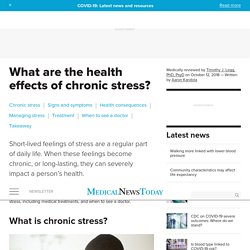
When these feelings become chronic, or long-lasting, they can severely impact a person’s health. In this article, we look at what chronic stress is, how to identify it, and the medical consequences it can have. We also describe ways to manage stress, including medical treatments, and when to see a doctor. Stress is a biological response to demanding situations. It causes the body to release hormones, such as cortisol and adrenaline. These hormones help prepare the body to take action, for example by increasing the heart and breath rates. Singaporeans are among the most stressed. Singaporeans are among the most stressed at work, globally. Singaporeans are among the most stressed at work, globally, the 2019 Cigna 360 Well-Being Survey – Well and Beyond has revealed.
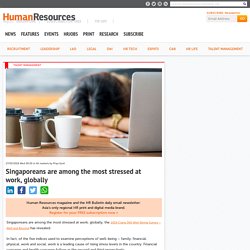
In fact, of the five indices used to examine perceptions of well-being – family, financial, physical, work and social, work is a leading cause of rising stress levels in the country. Financial concerns and health concerns follow as the second and third respectively. More importantly, the ‘always on’ corporate culture that is prevalent in Singapore is another contributor of stress, particularly among women – 71% feel they work in such a culture, as compared to 66% of men. On this, April Chang, Chief Executive Officer, Cigna Singapore, said: “A busy work life, combined with an ‘always on’ culture, is impacting the physical and social well-being of Singaporeans. “The stigma of seeking help for mental well-being may also prevent many from pursuing professional help.” ALSO READ: Mental wellness at the workplace: It goes beyond the occasional day-off The global snapshot.
Singapore spending on healthcare. Singapore spends $3.1 billion on stress-related illnesses annually: Study, Health News. SINGAPORE - A study has found that Singapore spends about US$2.3 billion (S$3.1 billion), or 18 per cent, of its total healthcare expenditure on stress-related illnesses annually.
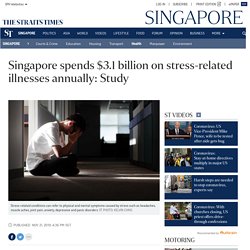
This put the nation's proportion of expenditure on stress-related illnesses second-highest out of the nine regions studied in the report, coming just 0.8 per cent behind Australia's 18.8 per cent. The other seven regions were Hong Kong, South Korea, Taiwan, Thailand, United Arab Emirates, the United Kingdom and the United States. The report, which was produced by healthcare consultancy firm Asia Care Group on behalf of health insurance and services company Cigna, was published on Thursday (Nov 21).
Globally, 84 per cent of people surveyed in past studies admitted to feeling stressed, said Cigna's regional chief executive officer Julian Mengual, while 64 per cent reported that they operated in an "always on" environment. Stress. Stress Symptoms, Signs, and Causes. In today’s fast-paced world, chronic stress is common, but your mind and body can pay a high price.
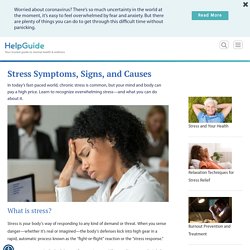
Learn to recognize overwhelming stress—and what you can do about it. What is stress? Stress is your body’s way of responding to any kind of demand or threat. When you sense danger—whether it’s real or imagined—the body’s defenses kick into high gear in a rapid, automatic process known as the “fight-or-flight” reaction or the “stress response.”
The stress response is the body’s way of protecting you. Stress can also help you rise to meet challenges. If you frequently find yourself feeling frazzled and overwhelmed, it’s time to take action to bring your nervous system back into balance. Fight-or-flight response: what happens in the body. Work Related Stress. Work related stress. Singapore's Depression Problem. Stress symptoms: Effects on your body and behavior. Stress symptoms may be affecting your health, even though you might not realize it.
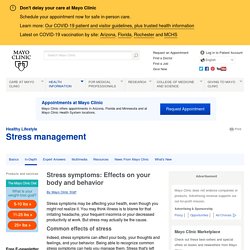
You may think illness is to blame for that irritating headache, your frequent insomnia or your decreased productivity at work. But stress may actually be the cause. How stress affects your brain - Madhumita Murgia. How stress affects your body - Sharon Horesh Bergquist. 5 problem-solving skills to manage workplace stress. (16) How stress is killing us (and how you can stop it).
Quick Stress Relief. Exercising to relax. How does exercise reduce stress, and can exercise really be relaxing?

Rest and relaxation. It's such a common expression that it has become a cliche. And although rest really can be relaxing, the pat phrase causes many men to overlook the fact that exercise can also be relaxing. It's true for most forms of physical activity as well as for specific relaxation exercises. Exercise is a form of physical stress. How exercise reduces stress Aerobic exercise is key for your head, just as it is for your heart. Regular aerobic exercise will bring remarkable changes to your body, your metabolism, your heart, and your spirits. How can exercise contend with problems as difficult as anxiety and depression? The mental benefits of aerobic exercise have a neurochemical basis.
Behavioral factors also contribute to the emotional benefits of exercise. Exercise and sports also provide opportunities to get away from it all and to either enjoy some solitude or to make friends and build networks. 1.